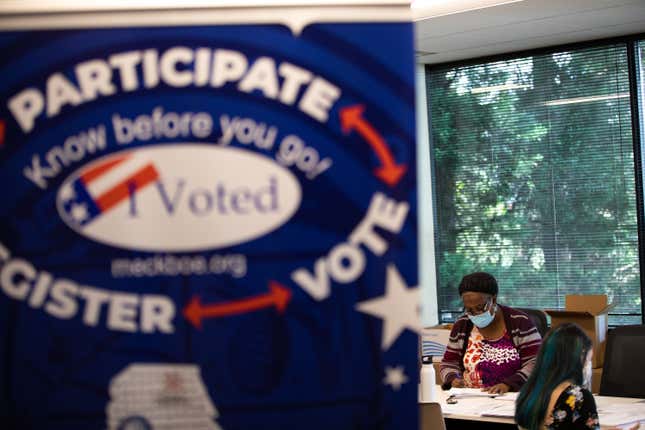
Voter suppression isn’t a new phenomenon. But as the country lurches toward a November election in which President Donald Trump has flatly refused to commit to a peaceful transition of power should he lose, concerns over the integrity of the voting process are as high as they’ve ever been.
Adding to those concerns is a new joint analysis from ProPublica and WRAL News finding that Black voters in North Carolina had their mail-in ballots rejected at twice the rate of the state’s white voters in 2018. And thus far, the rejection rates for 2020 have been on par with the rates from 2018.
Across all minority groups, the report found, “voters were nearly twice as likely to have their mail-in ballots rejected compared to white voters.” But the rejection rates were highest for Black voters, for whom 14 percent of their mail-in ballots were rejected. For white voters, the rejection rate was 6.3 percent.
“In total, 40 percent of rejected ballots were submitted by voters who identify as Black or African American, Indian American or Alaska Native, Asian, two or more races, or ‘other,’” ProPublica writes. And rural counties in North Carolina, a swing state, were just as susceptible to this disparity as urban ones. More than 6,000 ballots were rejected by North Carolina election officials during the midterm elections.
The rejection rates of mail-in ballots were especially high in the northeast corner of the state, bordering Virginia. Those counties have the highest share of Black residents,” writes ProPublica.
These disputes over legal ballots—particularly mail-in ones—are a top concern for voting rights advocates. Due to the coronavirus, many more Americans are expected to mail in their ballots this year. According to ProPublica, the state’s election officials predict that up to 40 percent of North Carolina’s voters will vote by mail.
If the current disparities hold up, that could have tremendous implications for Democrats across the ticket. Black voters comprise 46 percent of Democratic voters in the state, which is expected to be another hotly contested battleground in the presidential election.
The report wasn’t able to give a conclusive answer as to how Black voters have been so disproportionately affected: election officials say they don’t even have access to data about ethnicity or race when they are reviewing the validity of ballots.
“We don’t even look at it from this point of view. We just look to see if they followed all the rules,” Seneca Nicholson, chair of the Vance County Board of Elections, told ProPublica.
In 2018, those rules included “valid” voter signatures, as well as witnesses to sign and provide their own addresses to the ballot. Some election experts speculated that, because Black voters have historically been less likely to vote by mail, they may have been more likely to make mistakes.
But no one appears to be telling these voters that their votes have been tossed. Election officials across the board expressed surprise at the analysis’ findings and noted that they often try to reach out to voters to correct problems with their ballots before rejecting them.
However, when ProPublica and WRAL contacted a number of Black voters who had their ballots rejected, some told the outlets that this was the first time anyone had raised issues with their forms. They were unaware their votes hadn’t counted.
North Carolina isn’t the only state being scrutinized for the way it has rejected votes. A report from earlier this month found that Georgia wrongfully purged 200,000 voters from its rolls, many of them in the Atlanta Metro Area, where Black people make up 32.4 percent of the population.
The recent passing of Supreme Court Justice Ruth Bader Ginsburg has also created new urgency around free and fair elections. With a 6-3 conservative majority, some voting rights advocates fear further erosion of voting protections, building upon the gutting of the Voting Rights Act in 2013, in which Ginsburg, alongside Justices Stephen Breyer, Elena Kagan, and Sonia Sotomayor were in the dissenting minority.
It is one thing to urge Black people to vote. But any such effort would be in vain if their votes won’t even be counted.

